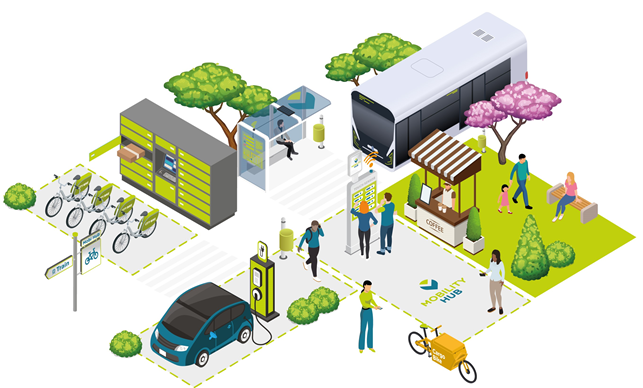Smart shared green mobility hubs
eHUBS bring together a range of electric mobility solutions. They provide users with a wide variety of options for sustainable travel within cities.
Partners
City of Amsterdam
Polis Network
Taxistop asbl
Autodelen.net
Bayern Innovativ GmbH
Cargoroo
URBEE
City of Nijmegen
City of Arnhem (subpartner)
Transport for Greater Manchester
City of Leuven
TU Delft
City of Dreux
City of Kempten (Allgäu)
TPR - University of Antwerp
Amsterdam University of Applied Sciences (subpartner)
Description
e-Mobility hubs (eHUBS) are on-street locations that bring together shared e-bikes, e-cargobikes (for transporting goods or people), e-scooters, and e-cars, providing novel shared mobility solutions tailored towards different situations and target groups. However, eHUBS are not merely a mobility solution. That is, they can also serve a variety of additional functions such as delivery pick-up points, secure storage for personal items or vehicles (e.g., scooters or bicycles), EV charging points, amenities (e.g., coffee shop), and work or social space (see illustration below).

In total, the eHUBS project consists of 15 partners and six pilot cities, across five European countries. Newcastle University is contributing to the Transport Modelling and Travel Behaviour Analysis work package. We focus on:
- helping to determine the best eHUB locations
- identifying target groups likely to use eHUBS
- identifying barriers to the use of eHUBS
- quantifying the potential emission savings
Savings are due to:
- direct shifts from private transport to eHUBS
- indirect shifts from private to public transport as facilitated by the use of eHUBS
Find out more about the eHUBS project, our research and project activities
.png)
.jpg)